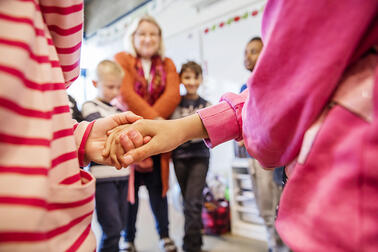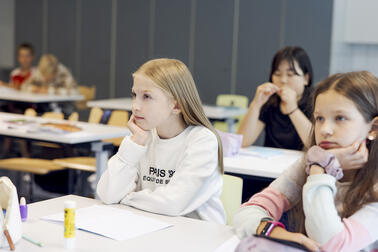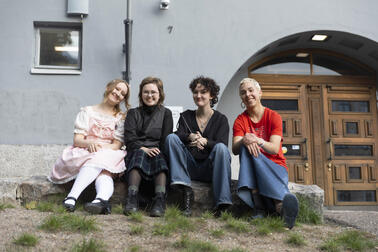
For three breaks a week, 5th–6th graders selected as peer supporters put their blue vests on. Lahja, 12, Asta, 12, Olavi, 12 and Leo, 12, think the vest may not be the trendiest accessory. In fact, they may sometimes slip it halfway into their pocket or wrap it up in the sleeve.
The most important thing is not how the vest is worn, but that the peer supporters are identified. The core of the peer support programme is youth participation, improving pupil welfare and preventing bullying.
“A teacher acting as a break supervisor may not see everything that is going on in the playground. We peer supporters keep our eyes open and tell an adult if there is a quarrel, or someone needs help,” Asta says.

Peer supporters make sure that no one is left alone.
“If we notice someone is alone, we go and see if they want to join the game. Sometimes you may have to persuade them at first, but they usually agree in the end,” Olavi says.
Riding a hobby horse
Maunula Primary School has been experimenting with peer support activities for a year and a half. The activities are familiar from lower secondary schools, where the school’s older pupils act as peer supporters for 7th graders.
“At lower secondary school, peer supporters can typically introduce pupils to each other, familiarise new pupils with the school, invite lonely pupils to join in, and take action against bullying. The same type of activity is also pursued at the primary school,” says class teacher Monika Autio, who is in charge of the peer support programme at Maunula Primary School.
“At our school, we pay attention to break activities. Our peer supporters have rotating shifts three times a week.”
There is a “hobby horse break” on Tuesdays, when hobby horse enthusiasts gather on the school’s field. Many of them bring their own tailored hobby horse from home, and hobby horses can also be borrowed from the school.
“Peer supporters are also there and may set up an obstacle course, for example. An established group of hobby horse enthusiasts participate every week.”

During play breaks, the peer supporters arrange games for the pupils according to the pupils’ wishes or suggest activities themselves. The most popular event of the week is the quiet break on Wednesday. Pupils can then stay indoors after lunchtime in the middle of the day and take a break on mattresses in the gymnasium.
“The gymnasium is often full, as many pupils need some downtime. The peer supporters’ task is to put the mattresses in the gymnasium, let the pupils in and supervise them with the teacher present, and ensure that everyone behaves calmly.”

Strong team spirit
According to Autio, the experiences gained from peer support activities are only positive. In addition to being able to tackle loneliness, peer support activities strengthen the team spirit of the whole school.
"The pupils see and feel that their well-being is cared for."
At Maunula Primary School, the peer supporters are selected through application forms and interviews. The purpose of the interviews is to assess the pupils’ motivation, for example. Many good applicants have not been selected, as more pupils have been willing to become peer supporters than can be selected.
This year, the school has a total of 12 peer supporters. Of them, experienced peer supporters participated in the selection of new peer supporters at the beginning of the school year with Autio and Hanna-Riikka Ikonen, another teacher responsible for the peer support programme at the school.

Peer supporters are trained for their task. Training sessions and meetings lasting about an hour are held a few times a term on school days. Otherwise, the peer supporters participate in teaching normally in accordance with the curriculum.
Helping is rewarding
Autio, who acts as the teacher in charge, hopes the peer support programme will be introduced at other primary schools as well.
“At first, it’s important to have enough time for planning the activities. It’s also a good idea to involve pupils in the planning, as they have many good ideas.”

The peer supporters at Maunula Primary School also encourage other schools to get involved in the activities. They feel the peer support activities have been fun, interesting and rewarding. The best thing is to be able to plan and implement break activities.
“It feels good to be able to help others and encourage them to get involved. Being together is more fun than being alone,” says Lahja.
Sixth graders will move to lower secondary school in the autumn. Changing schools is both exciting and appealing. Fortunately, they are welcomed by peer supporters there.

Original text in Finnish: Eveliina Lauhio
This article is part of a series that introduces Helsinki's actions to build a good future together, for each of us.
#education2030 #helsinkilearns #helsinkieducationfuturecompetences


